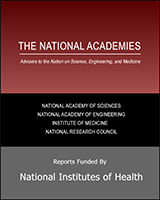NCBI Bookshelf. A service of the National Library of Medicine, National Institutes of Health.
Excerpt
On March 6 and 7, 2012, the Institute of Medicine’s (IOM’s) Forum on Microbial Threats hosted a public workshop to explore the emerging science of the “social biology” of microbial communities. Workshop presentations and discussions embraced a wide spectrum of topics, experimental systems, and theoretical perspectives representative of the current, multifaceted exploration of the microbial frontier. Participants discussed ecological, evolutionary, and genetic factors contributing to the assembly, function, and stability of microbial communities; how microbial communities adapt and respond to environmental stimuli; theoretical and experimental approaches to advance this nascent field; and potential applications of knowledge gained from the study of microbial communities for the improvement of human, animal, plant, and ecosystem health and toward a deeper understanding of microbial diversity and evolution.
Contents
Rapporteurs: LeighAnne Olsen, Eileen R. Choffnes, Alison Mack
Financial support for this project was provided by the U.S. Department of Health and Human Services: National Institutes of Health, National Institute of Allergy and Infectious Diseases, Centers for Disease Control and Prevention, Food and Drug Administration, and the Fogarty International Center; U.S. Department of Defense, Department of the Army: Global Emerging Infections Surveillance and Response System, Medical Research and Materiel Command, and the Defense Threat Reduction Agency; U.S. Department of Veterans Affairs; U.S. Department of Homeland Security; U.S. Agency for International Development; Uniformed Services University of the Health Sciences; American Society for Microbiology; sanofi pasteur; Burroughs Wellcome Fund; GlaxoSmithKline; Infectious Diseases Society of America; and the Merck Company Foundation.
Suggested citation:
IOM (Institute of Medicine). 2012. The Social Biology of Microbial Communities: Workshop Summary. Washington, DC: The National Academies Press.
The views presented in this publication do not necessarily reflect the views of the organizations or agencies that provided support for this project.
NOTICE: The project that is the subject of this report was approved by the Governing Board of the National Research Council, whose members are drawn from the councils of the National Academy of Sciences, the National Academy of Engineering, and the Institute of Medicine.
- NLM CatalogRelated NLM Catalog Entries
- The Social Biology of Microbial CommunitiesThe Social Biology of Microbial Communities
- LOC129932245 [Homo sapiens]LOC129932245 [Homo sapiens]Gene ID:129932245Gene
- TVAGG3_0898320 [Trichomonas vaginalis G3]TVAGG3_0898320 [Trichomonas vaginalis G3]Gene ID:75677625Gene
- TVAGG3_0898370 [Trichomonas vaginalis G3]TVAGG3_0898370 [Trichomonas vaginalis G3]Gene ID:75677630Gene
Your browsing activity is empty.
Activity recording is turned off.
See more...
